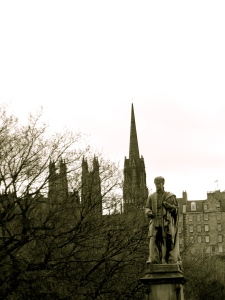I.
When I was working on the research for my second chapter yesterday afternoon, I followed a lead relating to one Walter Cook, Esq., W.S. – a member of the Lay Association established in 1843 by prominent Church of Scotland members “for carrying on the several Schemes of the Church with undiminished activity” following the Disruption. Although I found little information about Cook, an obscure 1882 text with some basic biographical information on him also had a profile of someone with whom I am very familiar – the subject of my first chapter, Rev. William Muir of St. Stephens. Naturally, I read on to see how a near contemporary would describe him. Although there was nothing paradigm shifting about his theology or ecclesiastical predispositions, there was a note about his first wife – Hannah Black Muir.
William and Hannah were married in 1813 and had a daughter and six sons. By the time they moved to Edinburgh, he was a rising star in the Church, having been awarded both Doctor of Divinity and Doctor of Laws degrees from the University of Glasgow before his thirty-fifth birthday.
But then suffering came. As another contemporary author described it, William Muir was “severely tried in the furnace of domestic affliction.” Between 1822 and 1826 he lost his daughter and three of his sons. Finally, in 1827, Hannah died.
All of these were things I knew. What I did not yet know was where Hannah and the four children who died in infancy were buried. In the note about Hannah from the 1882 sketch of William Muir’s life and ministry, the author revealed the mystery of their final resting place – the northeast corner of Greyfriar’s Kirkyard in the middle of Old Town. When exploring by myself or showing friends around, I’d walked past the grave several times without a clue. The lettering on the stone is hard to decipher in some places, and in others entirely missing after more than a century-and-a-half of exposure to the elements. On the bottom of the stone, the first two verses of 1 Thessalonians 4:14 are fairly visible. That verse – here as with on the stone in what we now know as the King James Version – reads: “For if we believe that Jesus died and rose again, even so them also which sleep in Jesus will God bring with him.”
II.
This past Sunday, my friend Cory Brock took the morning sermon* at St. Columba’s on Ephesians 3:1-14. In these verses, Paul writes to his fellow Christians in Asia Minor that his present suffering in a Roman prison is –in fact – their “glory.”
In the message Cory touched on a number of points, but one in particular which brought to mind the life of William Muir. When considering the nature and role of suffering, he rhetorically asked: “Why are parents burying their children, God? Why are bombs going off in European airports? Why? Why is this a part of the unfolding of history according to your eternal plans and purposes? Why?”
He later concluded by focusing on the purpose of suffering in the Christian life: “When Jesus comes, He brings a great reversal. No longer is suffering simply Satan’s tool to make you hurt, it’s the tool of redemption. Jesus Christ wins by losing. Jesus Christ suffers the most devastating, final death of sin, so that you who suffer temporally would never suffer the final, most devastating death of eternal death. Jesus Christ is the reversal of [the] cosmic view of suffering as being pointless. Suffering is the prelude to glory.”
Through the death of his wife Hannah, his daughter, and three of his young sons, William Muir found in the cross the answers to his own “why.” Though there was no indication of spiritual torpor prior to these tragedies, through them William Muir seems to have undergone a conversion experience. If not redemption, his suffering was at the very least a tool of galvanization. His later poetry reflected – again and again – his personal experience of suffering pushing him toward a greater reliance on Christ, rather than away from God. One poem written sometime later mentioned this explicitly. He wrote:
“Glory be to Thy Mercy’s dealing,
That subdued my rebel feeling.
Glory be to Thy chastening rod,
That brought and kept me near to God.
Glory be to Thy saving grace,
That draws me ‘neath Thy smiling face.”
As with William Muir in days past – through the power of the Holy Spirit – may it be so with us now.
*(To listen to Cory’s sermon: http://sermons.stcolumbas.freechurch.org/sermon/the-mystery-of-the-kingdom)
